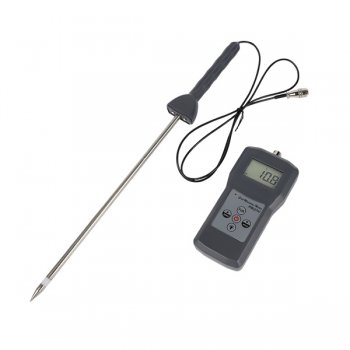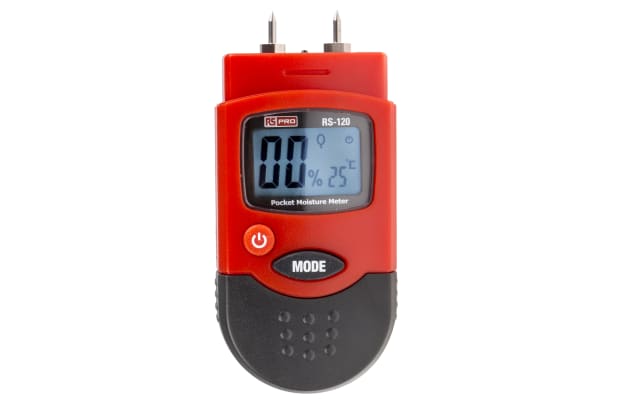How a Moisture Meter Can Enhance Your Construction Jobs and Protect Against Damage
How a Moisture Meter Can Enhance Your Construction Jobs and Protect Against Damage
Blog Article
The Ultimate Overview to Moisture Meters: A Comprehensive Summary and How They Can Conserve You Money
Wetness meters serve as crucial tools in spotting and keeping an eye on moisture content in products, aiding in avoiding costly damages and guaranteeing the top quality of products. Comprehending the subtleties of various types of moisture meters, their applications, and the potential cost-saving advantages they provide can be a game-changer for professionals and services alike.
Sorts Of Dampness Meters
One usual type is the pin-type dampness meter, which determines the electrical resistance in between 2 pins inserted right into a product. Pinless dampness meters, on the other hand, use electromagnetic sensor plates to scan a larger location without causing damage to the product's surface area.

Infrared dampness meters measure the thermal residential properties of a material to identify its dampness web content non-invasively, making them beneficial for applications where pin or pinless meters might not be suitable. Comprehending the various types of wetness meters available can aid industries select the most proper device for their particular moisture measurement requirements.

Advantages of Utilizing Wetness Meters
Wetness meters provide vital benefits in properly monitoring and assessing wetness levels in varied products and environments. One of the key benefits of utilizing wetness meters is the avoidance of prospective damages triggered by excess dampness.
Furthermore, making use of wetness meters can lead to enhanced power efficiency. In farming setups, dampness meters play an important duty in maximizing plant returns by allowing farmers to monitor soil wetness levels and make notified irrigation choices.
Just How to Select the Right Moisture Meter
Picking the proper dampness meter entails thinking about essential factors such as product compatibility, measurement array, and calibration precision. When choosing a moisture meter, it's important to guarantee that the meter is ideal for the details product you will certainly be screening. Various materials have differing electric residential properties that can influence dampness readings, so selecting a meter developed for your material is essential for accurate outcomes. Additionally, consider the measurement array of the dampness meter. Make sure that the meter can identify wetness degrees within the array needed for your applications. Calibration precision is another essential element to bear in mind. Opt for a moisture meter with dependable calibration to make sure consistent and specific readings. Some meters might require periodic calibration modifications, so comprehending the calibration procedure is essential. By thoroughly assessing these elements, you can select a wetness meter that satisfies your demands and gives accurate moisture dimensions for your jobs.
Proper Strategies for Moisture Meter Use

Price Cost Savings With Wetness Meter Applications
Exactly how can the critical application of moisture meters cause significant cost savings throughout different sectors? Wetness meters play a critical role in expense financial savings by stopping prospective damages and guaranteeing quality assurance in various sectors. In the farming market, moisture meters help in determining the optimum time for gathering plants, protecting against excess or over-drying wetness that can impact the end product's high quality. This specific surveillance helps farmers stay clear of unnecessary losses and maximize their return.
Likewise, in building and construction, moisture meters assist avoid expensive problems by discovering moisture degrees in building materials, such as timber or concrete, which can bring about architectural issues otherwise dealt with immediately. By identifying problem areas at an early stage, contractors can take corrective actions to prevent comprehensive fixings or replacements, eventually saving time and money.
Additionally, in the food handling sector, dampness meters click for info are necessary for keeping track of product quality and ensuring compliance with safety policies. By precisely gauging wetness material in foodstuff, producers can stop wasting, preserve freshness, and lower waste, leading to substantial price financial savings. Overall, the critical application of moisture meters is a valuable investment that can cause significant cost reductions and enhanced effectiveness across various sectors.
Conclusion
In conclusion, dampness meters are useful tools for determining and discovering wetness levels in different materials. By utilizing the appropriate moisture meter and following proper strategies, users can effectively protect against costly damages created by excess wetness.
Wetness meters offer as essential devices in detecting and keeping an eye on moisture material in products, assisting in preventing costly damages and ensuring the top quality of products. Infrared moisture meters gauge the thermal residential or commercial properties of a product to identify its moisture content non-invasively, making them valuable for applications where pin or pinless meters may not be appropriate.Wetness meters use invaluable benefits in properly monitoring and evaluating wetness degrees in diverse materials and settings. In farming setups, moisture meters play an important role in maximizing plant yields by enabling farmers have a peek here to check dirt wetness levels and make notified irrigation decisions.In conclusion, wetness meters are beneficial devices for measuring and finding moisture degrees in various products.
Report this page